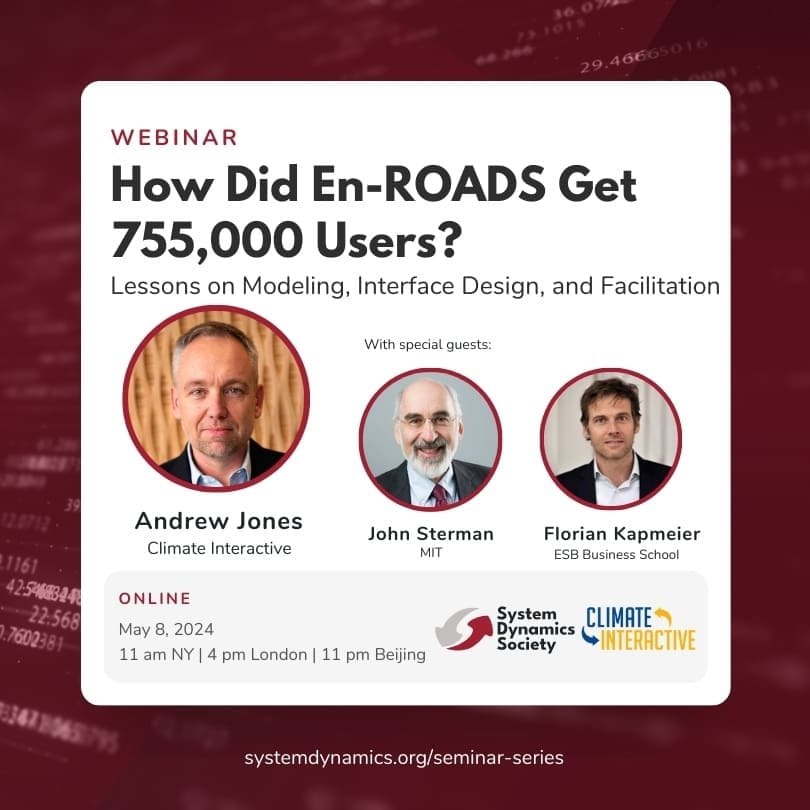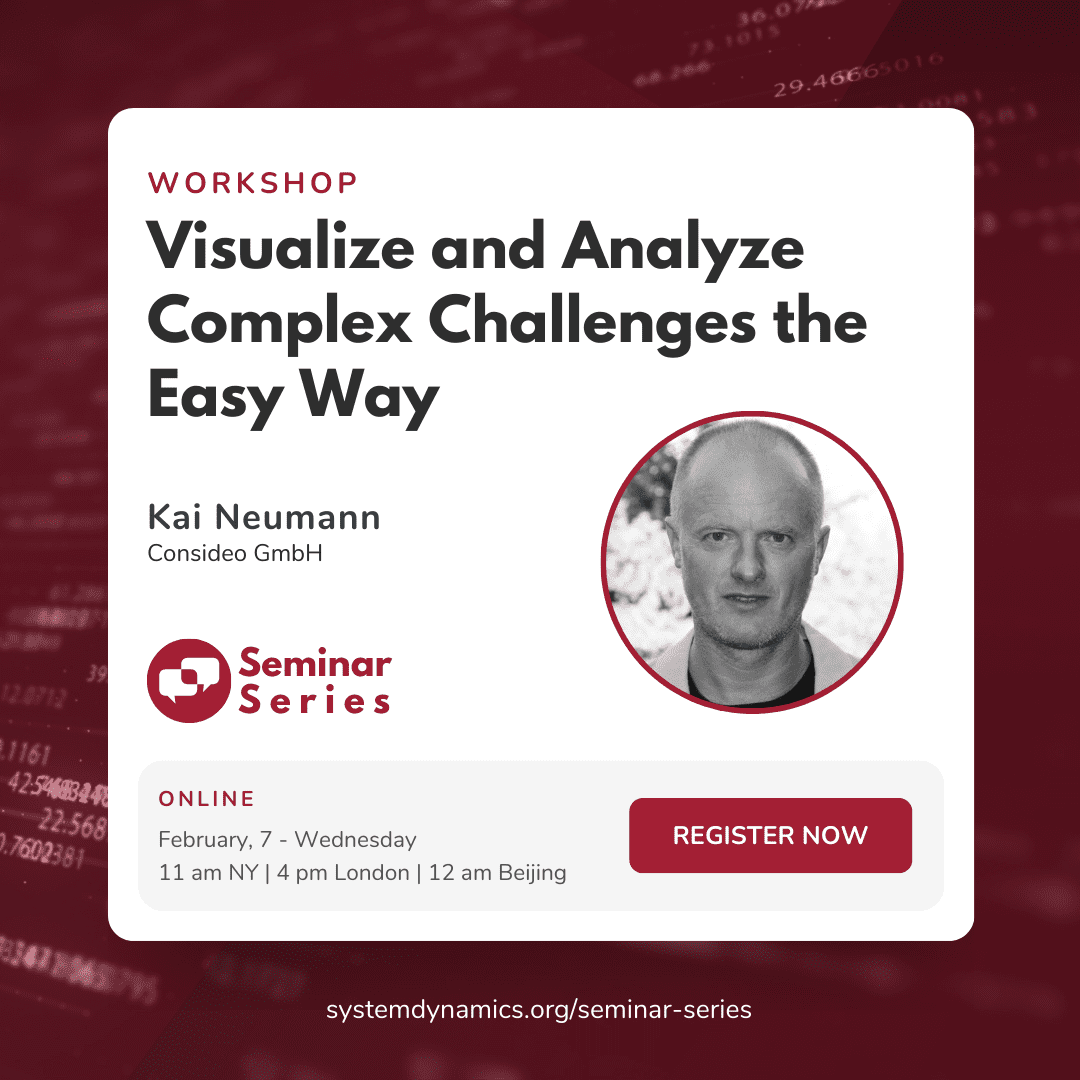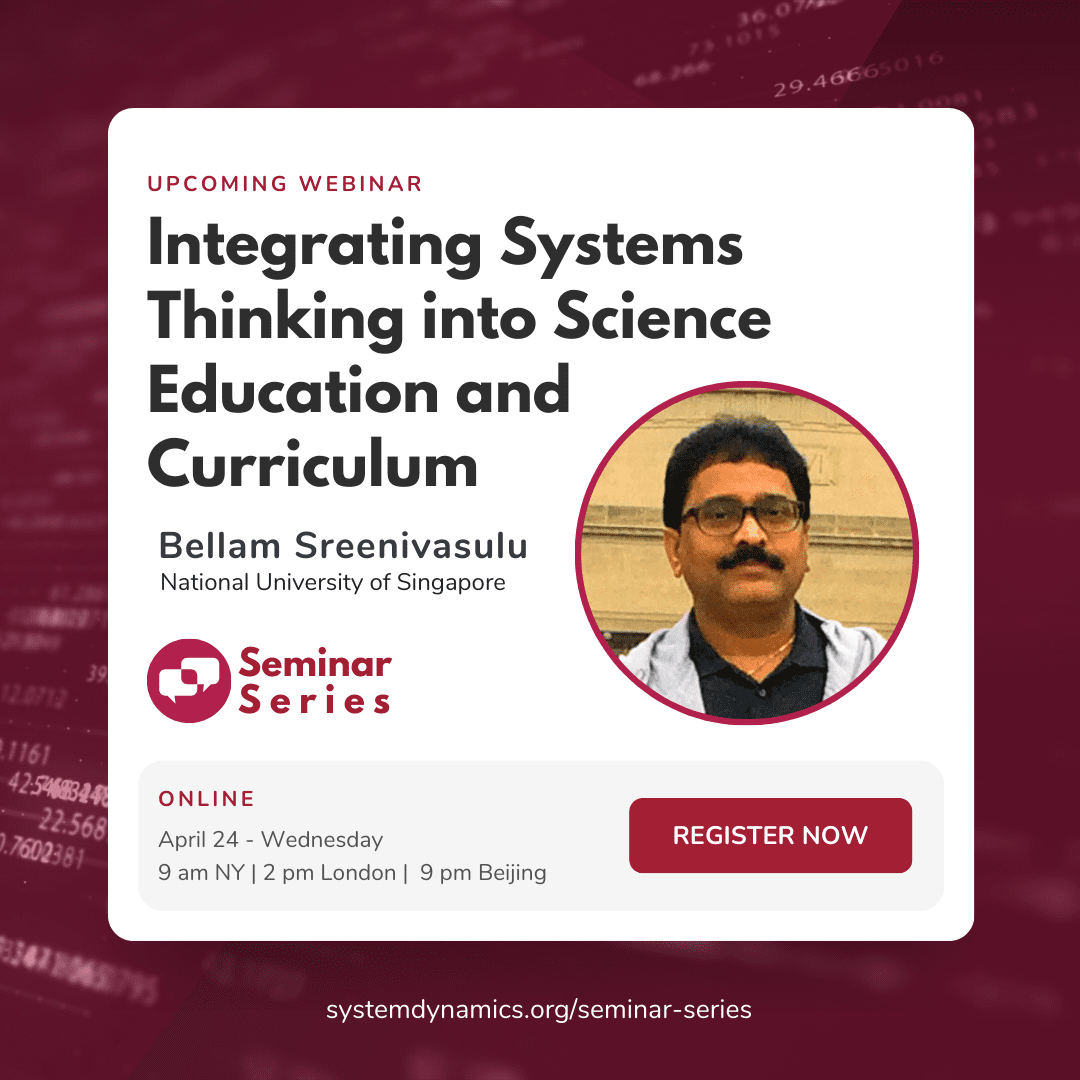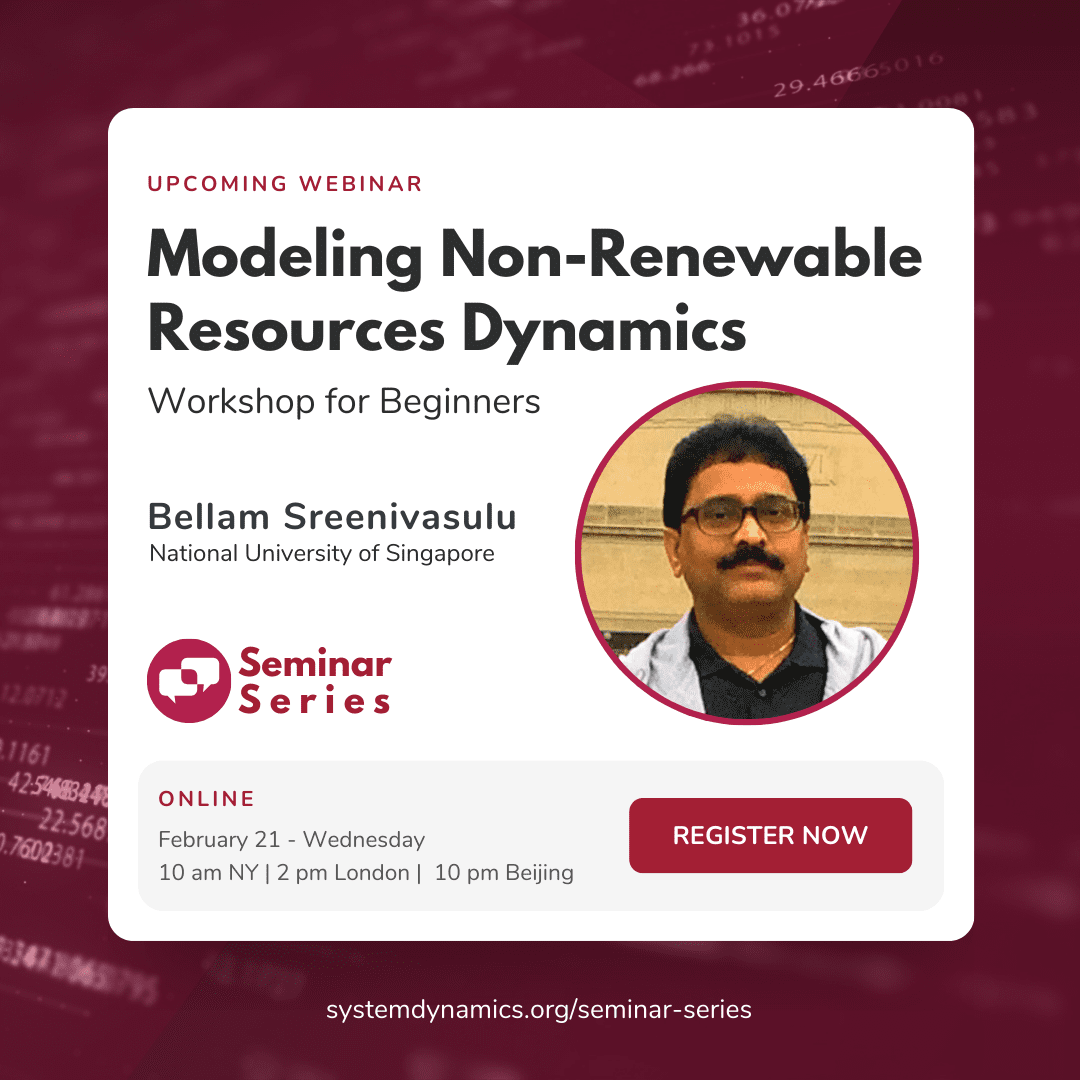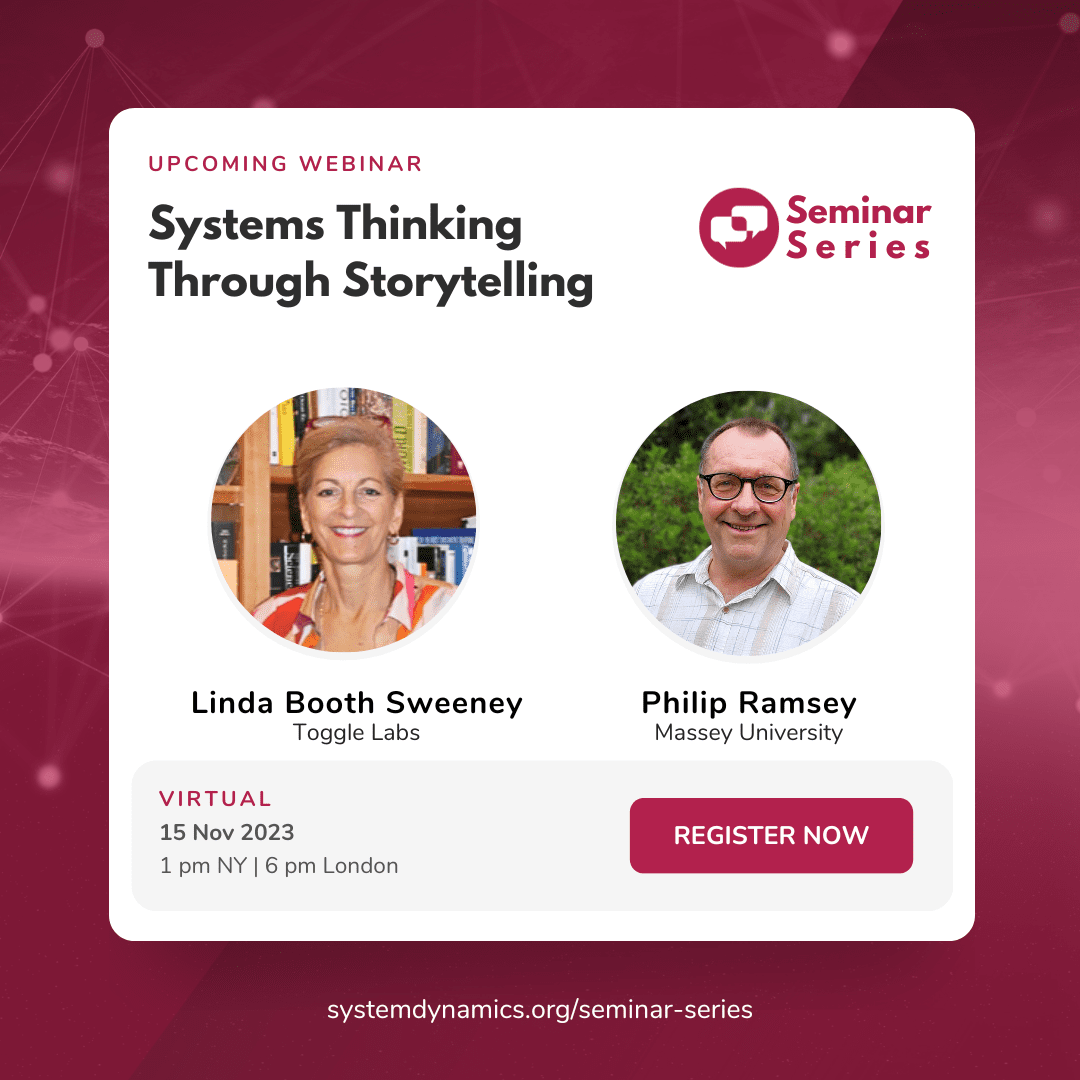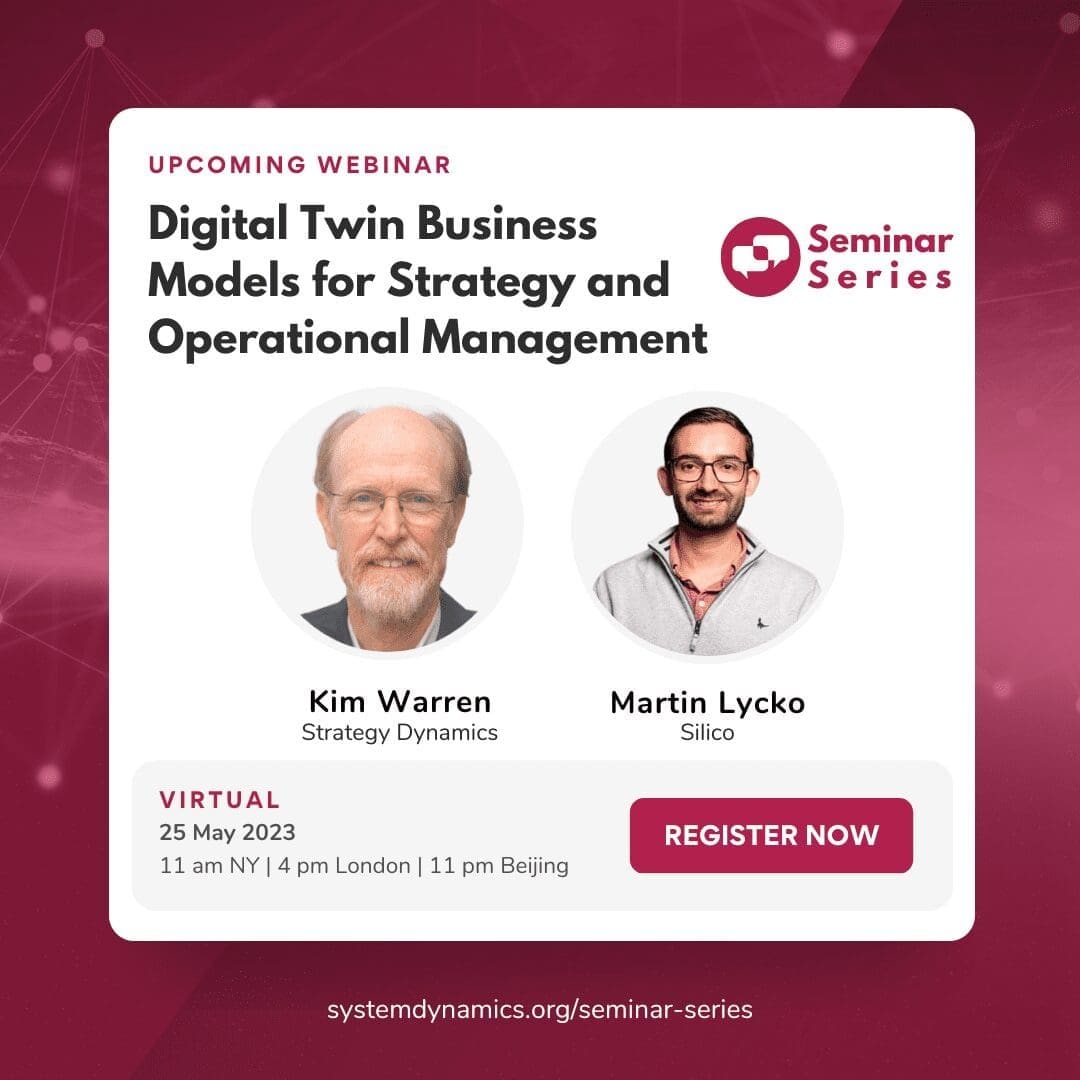How Did En-ROADS Get 755,000 users? Lessons on Modeling, Interface Design, and Facilitation
May, 8 at 11 am NY | 4 pm London | 11 pm Beijing | Time Converter
How Did En-ROADS Get 755,000 Users? Lessons on Modeling, Interface Design, and Facilitation
In this participatory webinar, Drew Jones of Climate Interactive will share insights on how to create a System Dynamics model and online simulator that will succeed at improving mental models and system performance at scale. The teams at Climate Interactive, MIT Sloan, and Ventana Systems designed its System Dynamics models C-ROADS and En-ROADS with the goal of improving the understanding of climate policy choices amongst decision-makers around the world, leading to deliberate strategies in three major areas: 1) modeling, 2) interface/UX design, and 3) facilitation, workshop design, game creation, training, and user support. This webinar will cover the design decisions made over the ~30 years of the project, generalizing the more universal insights for any system dynamics project.
About the Presenter
Andrew (Drew) Jones is Co-Founder and Co-Director of Climate Interactive. An expert on international climate and energy issues, his quotes and data stories appear in the New York Times, The Washington Post, and other media. Jones and his team at CI and MIT Sloan developed the climate simulations used by John Kerry and others to secure the 2014 bi-lateral U.S.-China deal that set up the Paris Agreement, as well as currently in the White House and Congress. Trained in System Dynamics modeling at Dartmouth College and MIT, Jones has worked at Rocky Mountain Institute and was a protégé of Dana Meadows. Jones co-accepted the System Dynamics Society’s award for the best real-world application of modeling. He won Dartmouth College’s Ray W. Smith award for the most significant contribution to the status of the College.
Special Guests
John D. Sterman is the Jay W. Forrester Professor of Management at the MIT Sloan School of Management and Director of MIT’s System Dynamics Group. He is the author of many scholarly and popular articles on the challenges and opportunities facing organizations today, including the book Modeling for Organizational Learning, and the award-winning textbook Business Dynamics. Prof. Sterman’s research centers on improving decision making in complex systems, focusing on environmental sustainability, climate change, alternative fuel vehicles and process improvement in organizations. He pioneered the development of “management flight simulators” of corporate and economic systems, many of which, including the C-ROADS interactive climate policy simulation he helped developed, are used around the world by governments, businesses, universities and the public. Among his honors, Sterman is the recipient of an honorary doctorate, has twice been awarded the Jay W. Forrester Prize for the best published work in system dynamics, received the best application award from the System Dynamics Society, was named one of MIT Sloan’s “Outstanding Faculty” by the BusinessWeek Guide to the Best Business Schools, and has received seven awards for teaching excellence from the students at MIT.
Florian Kapmeier is Professor of Strategy at ESB Business School at Reutlingen University, Germany. He received his doctorate from the University of Stuttgart on “Interorganizational Learning in Learning Alliances”. He has strengthened his academic profile with research visits at MIT Sloan School of Management (Cambridge, USA), McGill University (Montréal, Canada), University of Lugano (Switzerland), and Emlyon Business School (Lyon, France). For his research and teaching activities, he links the System Dynamics methodology with empirical research on theory development and testing, focusing on organizational aspects of the understanding of complexity, increasingly addressing environmental sustainability issues. He works closely with the Climate Interactive to raise awareness of the consequences of climate change, using the suite of Climate Interactive’s simulation models. Florian has collaborated closely with Climate Interactive to develop the En-ROADS Climate Workshop, the Climate Action Simulation Game, and resources for the World Climate Simulation. In addition, he has helped translate both event materials and website resources for the World Climate Simulation. Florian has facilitated numerous En-ROADS and World Climate events with groups between 12-60+ people since 2014, from high-school and university students to corporate and political policy makers.
Workshop: Visualize and Analyze Complex Challenges the Easy Way
February, 7 at 11 am NY | 4 pm London | 12 am Beijing | Time Converter
Workshop: Visualize and Analyze Complex Challenges the Easy Way
Facing challenges that involve multiple interacting factors requires a methodical approach to visualize and analyze these interconnections. Qualitative modeling provides a straightforward way to map out cause-and-effect relationships. This approach is adaptable, suitable for use in workshops, collaborative models, or individual analysis.
This workshop introduces the user-friendly Consideo iModeler tool to assign weights to connections without the need for complex formulas. Utilizing the Insight Matrix, participants can easily identify key factors that either contribute to or hinder progress towards their objectives.
The session delves into the scientific principles underpinning this qualitative approach, explaining how results are derived. Additionally, it offers a comparative analysis of qualitative and quantitative models, drawing on real-world project examples. This seminar is designed to equip you with the tools to make informed decisions in complex scenarios.
About the Presenter
About Consideo iModeler
Consideo iModeler is a cutting-edge software tool designed to visualize and analyze complex situations, making it easier for users to plan, make decisions, and communicate more effectively. This software stands out for its unique Insight Matrix feature, which provides a revolutionary way to handle complexity. It allows both qualitative and quantitative modeling, including System Dynamics for scenario modeling.
Systems Thinking for Sustainability: A Proposal for International Cooperation
January, 17 at 11 am NY | 4 pm London | 12 am Beijing | Time Converter
Systems Thinking for Sustainability: A Proposal for International Cooperation.
The international cooperation proposal “System Thinking for Sustainability” is an initiative led by the Autonomous University of Bucaramanga (UNAB) whose fundamental objective is to address current challenges in favor of global sustainability. It is based on the application of Systems Thinking, a comprehensive approach that seeks to understand and solve complex problems from a holistic and interconnected perspective.
This proposal focuses on promoting sustainable development through collaboration and promoting innovative solutions. Through the analysis of complex systems and the identification of interdependent relationships, it seeks to find strategies to address contemporary dilemmas in key areas such as energy transition, organizational and institutional change for sustainability, water management, cybersecurity and the promotion of education and scientific vocations.
A look at the problems of dissemination of systems thinking: Recognizing the challenges of effectively disseminating Systems Thinking, the proposal focuses on identifying strategies to overcome dissemination barriers and promote a broader and deeper understanding of this approach, promoting its adoption and application in various areas and sectors.
An organizational proposal for coordination to improve impact: The initiative focuses on establishing an effective organizational structure that facilitates coordination between various actors interested in Systems Thinking. It seeks to enhance the impact of this approach by creating collaborative platforms, knowledge-sharing networks and strategies to promote its practical application in relevant contexts.
Development of educational tools and resources: The creation and dissemination of educational materials and practical tools that allow the understanding and effective application of Systems Thinking are sought. This includes the development of digital resources, methodological guides and training programs to encourage greater adoption and understanding of this approach.
About the Presenter
Integrating Systems Thinking into Science Education and Curriculum
April 24, 2024 at 9 am NY | 2 pm London | 9 pm Beijing | Time Converter
Integrating Systems Thinking into Science Education and Curriculum
For teaching and learning science through rich-contexts and complex real-world scenarios, application of systems thinking approaches offers convenient platform. This framework can be well integrated into problem-based learning, learning from case studies, project-based approaches etc. Compared to reductionist approach, systems approach will also facilitate students’ holistic and interdisciplinary understanding about a complex problem. Along these lines, this seminar focuses to explore the scope of applying systems thinking concepts into science teaching and curriculum with a focus in the context of chemistry teaching and learning.
About the Presenter
Dr. Bellam Sreenivasulu, Senior Lecturer and Resident Fellow at the Residential College-4 (RC4), National University of Singapore (NUS), holds a Ph.D. in Chemistry and a postdoctoral fellowship from the Institute of Chemical and Engineering Sciences (ASTAR, ICES). He has extensive teaching experience in chemistry and applied chemistry such as supramolecular chemistry. Currently, at RC4, Dr. Bellam specializes in systems thinking and system dynamics (ST&SD) curriculum with a focus on modeling real-world complex problems in relation to energy systems- sustainable energy, renewable energy, carbon emissions etc. He also teaches topics such as ‘Sleep Health for Holistic Wellbeing’ applying systems thinking approach. His educational research interests include chemistry education, ST&SD education exploring students’ learning and misconceptions in these areas.
Hands-On Workshop: Modeling Non-Renewable Resources Dynamics
Feb 21, 2024 at 9 am NY | 2 pm London | 10 pm Beijing | Time Converter
Hands-On Workshop: System Dynamics Modeling Non-Renewable Resources Dynamics
This session about modeling the depletion of non-renewable resources is intended to enable participants to understand the problem holistically through systems approach. First, they will learn to construct causal loop diagrams (feedback loops) by applying systems thinking concepts, and then learn to develop stock and flow diagrams as models for simulations to study how a system structure generates the behavior of overshoot and collapse of non-renewable resources. At the end of this session, the participants will be enabled to:
- Identify the cause and effect interactions among the key variables in the given system scenario to develop feedback loops
- Build stock and flow diagram to quantify the model on Vensim
- Run the simulations on Vensim to observe predicted dynamic behavior
- Propose policies for sustainable use of resources
This hands-on practice session is intended to engage beginners in the field of systems thinking and System Dynamics. It is expected to run for 2 hours.
Download the Software
This workshop will make use of Vensim PLE, the free version of the modeling software provided by Ventana Systems. To ensure efficient use of time during the workshop, we kindly ask all participants to download the software in advance from https://vensim.com/free-downloads/
Pre-Work Tasks
Before attending the workshop, please complete the PRE-WORK TASKS to ensure a productive learning experience:
- Watch the introductory segment (up to 10 minutes) of the video on ‘drawing causal loop diagrams (CLDs) in Vensim’ to familiarize yourself with the basics of CLD creation in Vensim. Access the video here: Vensim Causal Loop Diagramming Video.
- Practice drawing CLDs by replicating the example shown in the video. Once comfortable, save your version of the CLD in the ‘.mdl’ format with your name as the filename.
- Learn about constructing simple Stock and Flow Models in Vensim by watching the relevant video. This will provide foundational knowledge in creating stock and flow diagrams (SFD). Access the video here: Building a Simple Vensim Model.
About the Instructor
Dr. Bellam Sreenivasulu, Senior Lecturer and Resident Fellow at the Residential College-4 (RC4), National University of Singapore (NUS), holds a Ph.D. in Chemistry and a postdoctoral fellowship from the Institute of Chemical and Engineering Sciences (ASTAR, ICES). He has extensive teaching experience in chemistry and applied chemistry such as supramolecular chemistry. Currently, at RC4, Dr. Bellam specializes in systems thinking and system dynamics (ST&SD) curriculum with a focus on modeling real-world complex problems in relation to energy systems- sustainable energy, renewable energy, carbon emissions etc. He also teaches topics such as ‘Sleep Health for Holistic Wellbeing’ applying systems thinking approach. His educational research interests include chemistry education, ST&SD education exploring students’ learning and misconceptions in these areas.
Navigating Client Dissatisfaction
11 am NY | 3 pm London | 11 pm Beijing | Time Converter
Navigating Client Dissatisfaction
Every consultant has their share of success stories, but what happens when the client doesn’t like the analysis? Dive deep into the realities of professional consultancy where not every project ends with a fairy tale conclusion. In this session, Dennis Sherwood will share his personal journey of a decade-long engagement with a government client. Through this lens, he will shed light on the complexities and challenges faced when results don’t align with client expectations.
Join us to:
- Delve into the intricate dynamics of client relationships beyond conventional success narratives.
- Unpack strategies to manage, navigate, and turn around situations when clients are dissatisfied with the outcomes.
- Engage in an open forum to share your own experiences of when project outcomes diverged from client expectations.
About the Presenter
Dennis Sherwood has championed organizational innovation and creativity for over 20 years through his UK-based consultancy. A fervent advocate of systems thinking, Dennis’s vast experience ranges from being a consulting partner at Deloitte to holding pivotal roles at establishments like Goldman Sachs and SRI Consulting. An acclaimed author, Dennis has authored 15 books on topics spanning innovation, creativity, and systems thinking, with titles such as “Seeing the Forest for the Trees” and “How to Be Creative: A Practical Guide for the Mathematical Sciences.” Join us as Dennis unravels the nuances of client relationships, providing invaluable insights from his distinguished career.
Systems Thinking Through Storytelling
1 pm NY | 6 pm London | 2 am (Nov 16) Beijing | Time Converter
Systems Thinking Through Storytelling
Join us for a free seminar with Linda Booth Sweeney and Philip Ramsey, systems educators and authors whose books help teach about systems thinking through storytelling.
Linda will share “Curious about Connections,” a simple, inquiry-based teaching framework that fosters collaborative, inclusive dialogue while promoting systems thinking, critical thinking, communication skills, and empathy. She’ll demonstrate how to use this facilitation method using picture books as well as everyday scenarios. She is excited to share this facilitation method with our System Dynamics community and to explore ways families, teachers, and professionals can use it in a variety of settings.
Phil will share about his newly published Billibonk and Frankl book series, a collection of captivating jungle-based fables that showcase principles of systems thinking through the experiences of various animal characters. The stories are engaging and relatable to both children and adults, as they demonstrate how different species in the jungle learn to collaborate and solve problems together. The Billibonk and Frankl stories aim to help children see systems and interdependencies in the world around them.
About the Speakers
Linda Booth Sweeney is an educator, writer and strategist for healthy socio-ecological systems change, Dr. Linda Booth Sweeney is internationally recognized for her efforts to make systems thinking actionable by a wide range of audiences. In her Systems Leadership Labs, Linda creates experiences for leaders to think differently, and to experiment with language, visualization tools and knowledge architecture that better mirrors the complexity they are navigating. She is co-author of The Systems Thinking Playbook, The Climate Change Playbook, and numerous other books and journal articles. Her next book, Apart Together, is a gentle introduction to systems thinking for children and will be published by Balzer & Bray in October 2023. Linda holds her doctorate from Harvard’s Graduate School of Education and lives outside of Boston where she enjoys swimming in Walden Pond and amateur farming. For more information, see:
(systems), www.lindaboothsweeney.net
(children’s) www.lindaboothsweeney.com
(metaverse) https://togglelab.com
Phil is a Senior lecturer at Massey University in New Zealand, where he teaches Organizational Learning, Leadership, and Teamwork. He also works as a Director of Incite Learning, a consulting company that mainly works with schools, helping school leaders apply Organizational Learning concepts to solve tough problems.
Digital Twin Business Models for Strategy and Operational Management
11 am NY | 4 pm London | 12 am Beijing | Time Converter
Digital Twin Business Models for Strategy and Operational Management
In the business field, dynamic models have long been used for simulating long-term plans (3+ years) and medium-term challenges and issues playing out over a few months or quarters. But models have also been used to understand shorter-term phenomena, such as in supply-chain and service-delivery cases. Often, though, the same structures and mechanisms operate over both short and long-time scales. Examples include customer acquisition and retention, and staffing (hiring, promotion, and turnover), and performance-improvement programs. This webinar will show how a single model can capture both short-term and strategic views of the same issue, enabling management to have a coherent long-term plan and to check the impact of that plan on short-term tactical episodes. Taken to the extreme, this approach can get close to offering a “digital twin” of a business or some part of the business, that closely matches its actual performance as well as the development of the wider system that drives that performance. Similar considerations may well apply to plans and challenges in other domains. In this webinar, you will learn:
- The benefits of using System Dynamics to capture both short-term and long-term perspectives of a business issue.
- How to design and implement effective digital twin architectures that can improve organizational performance.
- Real-world examples and case studies of how System Dynamics and digital twins have been used to optimize business performance and drive competitive advantage.

